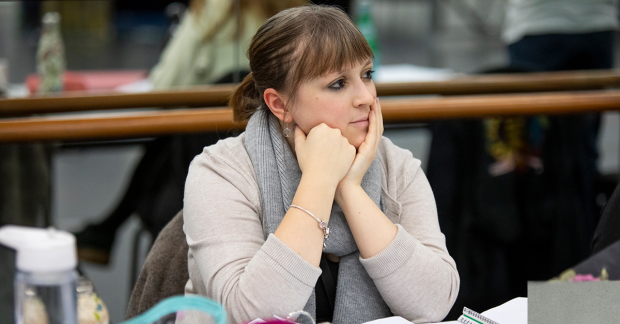Lisa Lewis: So you want to be a stage manager?
WhatsOnStage asks creatives to give their tips and tricks for starting their careers in the arts

© Ellie Kurttz
We asked Lisa Lewis, deputy stage manager on Curve Leicester's West Side Story, to give us tips and advice for cutting your teeth in the theatre world.
Can you introduce yourself?
Hi, I'm Lisa Lewis and I am deputy stage manager for West Side Story.
When did you know that you wanted to be a Stage Manager?
I trained as an actress at Aberystwyth University and spent a little time learning the choreography and lines but also learning what stage management did. I then did extra-curricular projects at the university and in the community to gain skills in the field. I loved the prop making, the calling and all things stationery.
What was the first project you worked on?
The first project I worked on was a festival for Dylan Thomas in Machynlleth with a small company called Louche Theatre. After the festival, I went to do an MA in Stage and Events management at Royal Welsh College of Music and Drama. Once I completed my training, I worked at the Royal Opera House on Scala Di Seta and Idomeneo where I fell in love with music and orchestration.
Who helped you during the early part of your career?
In my early career my biggest influence was Lee Batty who was a production manager at the Edinburgh Fringe Festival. He gave me my first big ASM book cover role in the West End, and without his advice and guidance I would have felt quite lost in this industry.
What advice would you give to your younger self?
The advice I would have given my younger self was to enjoy the early days a lot more than I did. It can be surrounded by fear of being a freelancer and thinking you have to say yes to every job that gets offered. I would say to relax and enjoy all the new opportunities that come along, that every opportunity will take you on an adventure. There is no wrong path.
What advice would you give to anyone wanting to be a stage manager?
The advice I would give to anyone wanting to be a stage manager is to bring humour and positivity to every job, especially when you are an assistant stage manager. I would also say listen when starting out, it's a key element you need as a stage manager and you can learn so much from experience.
What resources proved most valuable to you during your early career?
The resource that proved most valuable to me during my early career was my training at Royal Welsh College of Music and Drama. It opened up new career opportunities and meant I could be placed in front of the top industry employers.
What mistakes do you think are the easiest to make when starting out?
I think the mistake I made when starting out was being too eager. I would try and second guess what was going on instead of listening and learning from the more experienced members. I found the best way to excel in this industry is to do what is asked of you, to be available and useful at the right times. Observing and finding your place in a rehearsal room can be hard and it's easy to be over keen and overbearing when the best intentions are meant.
What would you say is the most rewarding aspect of your job?
The most rewarding aspect of my job as a deputy stage manager is seeing the whole production put together. It's such an achievement when you see all the efforts of the company on opening night.
What would you like to see in future generations?
In future generations I would like to see the stage management role grow and be seen as more collaborative rather than functional. Each year the respect for the technical department is growing and I'm hoping they continue to become equals in the industry.
















